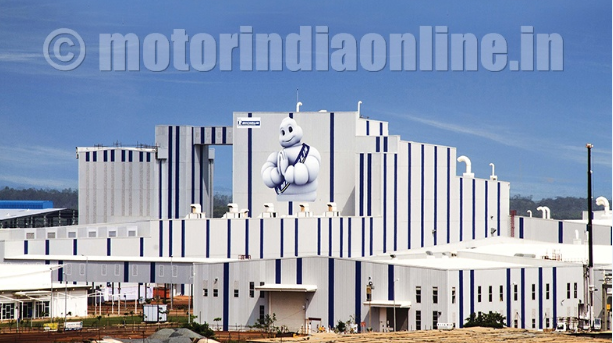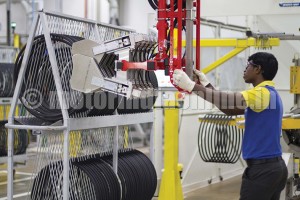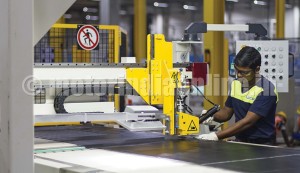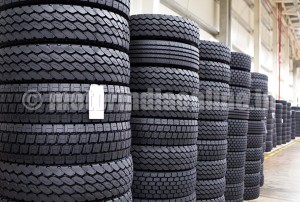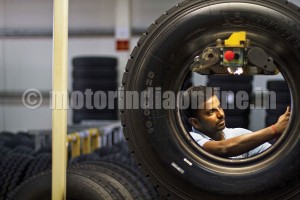Well set for long haul in the growing market
Approaching the Thervoy Kandigai industrial park SIPCOT, about 60 km north of Chennai, one can see the beginning of an industrial landscape, with gleaming new age factories operational and under construction on land stretches interspersed with a cluster of villages. Michelin’s Thervoy plant is located in the industrial zone and on a vast stretch of 290 acres surrounded by captivating natural scenic beauty and greenery all around. A big picture of the popular Bibendum – Michelin’s tyre man, the company’s mascot which was declared the ‘mascot of the century’ by London’s Financial Times – affixed on the factory frontage that welcomes visitors with the traditional Indian ‘namaste’, sending indeed an unequivocal message of the company adjusting itself to the Indian cultural stream.
The occasion was the launch of Michelin’s tubeless radial truck tyres on July 27 specially engineered and manufactured at the Chennai plant for the Indian road and climatic conditions. Michelin showcased the products to the media through presentations, interactions and a plant visit, the first of its type since commencement of commercial production of tube type radial truck tyres in early 2014.
Welcoming the gathering, Mr. Nour Bouhassoun, Chairman and President, Africa – India – Middle East, highlighted the background of Michelin Group operations, its standing in the global scene and the segments to which its products are being supplied. He said: “Michelin is involved in the mobility business for everyone everywhere, manufactures almost every segment tyre and provides the solutions for customers. It’s a global premium brand and clocked a sales turnover of Euro 19.55 billion in 2014. It has sales network in 170 countries, 68 plants in 17 countries, and about 112,000 employees, including 6,000 in the global R&D network. The company invented the radial tyres and is world No.1 in passenger car high performance tyres, radial truck tyres and many other segments. We sell worldwide around 180 million tyres annually and have a global tyre market share of 13.7%. We are the technology leader and No.1 globally for fuel efficient tyres.”
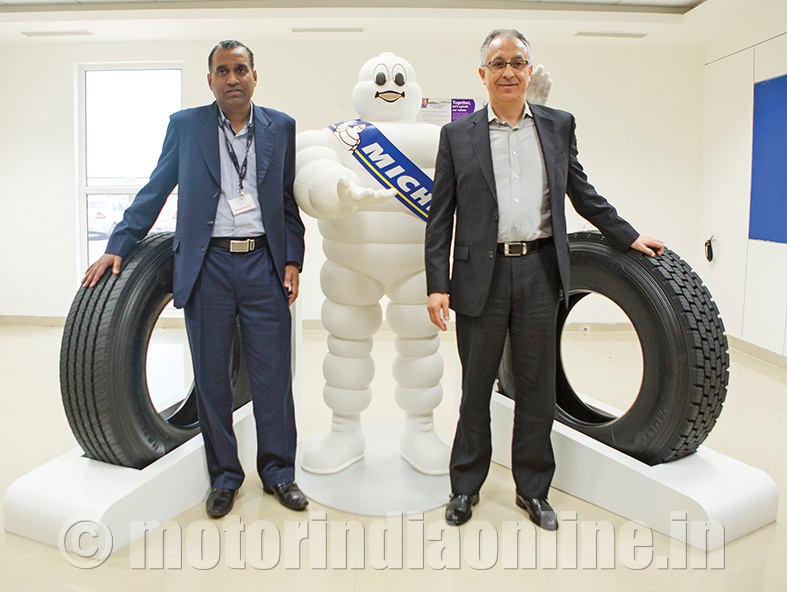
He added: “Apart from the tyre domain, Michelin is also into lifestyle and travel planner segments. Michelin India is a new story and we have invested around Rs. 4,000 crores in the new plant – a green factory with about 1,500 persons employed therein. We also undertake extensive training and invested in research, development and innovation (RDI). Most of the persons in RDI are undergoing training at various plants and are expected to take over operations in India shortly.”
Mr. Nour Bouhassoun also outlined the extensive CSR programs conducted by the company to uplift people’s lives in the surrounding villages by providing employment, healthcare, sanitation and education.
Mr. Mohan Kumar, Commercial Director – passenger car and light truck and truck, indicated that Michelin has a three-pronged business approach – firstly by providing sustainable mobility and long-term total performance thro’ fuel-efficient tyres and working on several green initiatives; secondly offering good customer experience based on their global background, getting closer to them by establishing the dealer service points in more than 100 cities and further expanding the distribution network; and lastly at a higher level working on new developments connected with other applications in the industries.
“As for the India program, we are looking at a long term and our growth efforts and investments are with that orientation. We are witnessing a positive momentum of new technology adoption in the Indian commercial vehicle segment and believe it’s the right time to offer the discerning fleet owners the new world of tubeless tyres. Our latest tubeless ‘Michelin X Multi range’ has been specially designed and engineered, keeping in mind the weather conditions in India, to offer better and safer driving experience, coupled with significantly increased cost effectiveness to the businesses that transport goods across the country,” added Mr. Kumar.
Thrust on tubeless technology
Michelin is introducing two tyre models for the trucking segment – ‘Michelin X Multi Z’ for the steer axle and ‘Michelin X Multi D’ for the drive axle. The salient features of the tyres include new tread rubber compound that slows down the tread rubber wear rate to offer tyre longevity; new wider tread and casing design that allows for the maximum contact with the road surface, thus offering better grip on wet and dry roads for safer driving experience; a special rubber compound for the new crown design which reduces tyre damage, thus enhancing the capability to get retreaded, i.e., multiple lives from the same tyre, reinforced bead design with more metallic wire for higher strength and endurance for long-distance drives; and new double sector mould technology for even wear and tear on the tyre and for better handling during high speed driving, compliance with the strictest environmental standards to control fuel consumption and reduce noise.
Mr. Mohan Kumar further observed: “We set the pattern in India to transform the market from bias to tube type radial, and now are on the mission to again shift the market from that position to a higher level of tubeless radial. In the ‘Multi range’ the steer and drive axle tyres are different, and the discerning customers have understood the need for the same. The drive axle tyre gives the grip for traction while the steer axle tyre provides for easy manoeuvrability and stability. The tubeless tyres are lighter and can hence carry more payload. Rolling resistance is lower because of the tread pattern and depth, thereby facilitating fuel savings. With better heat dissipation the speeds can be higher and the life longer, thus ensuring the customers the economical TCO, viz., cutting down fuel costs and tyre related maintenance expenses. The ‘Multi range’ tyres offer up to 30% increased mileage and 4% fuel savings as against the Michelin tube type radial tyres.”
The interaction with the media was followed by the plant visit. The plant was really impressive with diverse sophisticated machinery and materials handling systems operating in the production lines. The automation level was striking, and the safety issues, quality aspects, hygiene and working ambience were on par with any modern process engineering facility in developed countries. The bar has indeed been raised high by Michelin in the segment.
Rolling forward
The Michelin Group which signed an MoU with the Tamil Nadu Government in 2009 commenced tyre production during the first quarter of 2014. The company produced 11,000 ton in 2014 and expected to touch 16,000 ton during 2015.
Mr. Nour Bouhassoun summarised: “Our journey is India has just started. This factory is dedicated to producing truck and bus radial tyres, and we want to expand in the same direction down the timeline. No specific capacity targets have been fixed, and we want to grow slowly before taking on the big market of 16 million truck tyres. The radial market is growing at an impressive 14%, and before even thinking about higher growth rates we have to learn how to operate in the Indian market. Yes, we are laying the right base today to address the future market.”
Michelin is investing heavily to understand the market ground realities before introducing new products to meet the segment needs. Having done it successfully earlier with tube type radial, its endeavour in tubeless is expected to be a smooth rolling.
However Michelin is aware of the high customer expectations and growing international and local competition, hence taking cautious but firm steps to make a steady progress. At the appropriate time the company is bound to step on the gas and shift to the overdrive, and when that happens, it is likely to pull way ahead of the competition to set new benchmarks in the Indian tyre market.
Mr. Nour Bouhassoun and Mr. Mohan Kumar interacted with the media to provide interesting insights about the product and the company’s initiatives in offering customers a new driving experience.
Excerpts:
Could you comment on the evolution and acceptance of radials in the bias-dominated Indian market?
The erstwhile bad roads, overloading and low speeds suited well the bias tyres. But with better roads, correct loads, higher speeds and safety issues, radials have started taking over the market from bias tyres. Radial tyres have cornered a market share of 30% within a period of four years. We are already seeing the inter-city coaches switching over to radials. In the truck segment too we are witnessing the radials taking off slowly. From the passenger safety angle, puncture and tube blow out at higher bus speeds would be catastrophic and the tubeless radial would be the correct choice; and the switch is already happening, from tube to tubeless radial tyres. In the developed countries all the trucks have switched over to radials, and we should see that eventually happening here in the local market.
Focus for the present will be replacement market and not OEMs. Can you elaborate and also tell us about the importance of retreading in India?
Yes, for the ‘Multi range’, focus will initially be on the replacement market. As for the OEM approach, we want to start it in a professional way and are not ready as yet. We are supplying our radials to bus OEMs like Volvo and Scania. In the truck segment we are supplying to MAN. In the retreading segment, which is very important for us, we are world No.1. We are also No.1 in the US, the Europe and many other countries, and with the prevalent strong retreading culture in India, we would like to have that numero uno position here as well.
What are your views on exports and export certification?
As regards exports, we have plans to cover countries which are closeby, but our main objective in putting the plant here is to cater to the local market and become an important player down the timeline. All our plants have export certification, meaning E-mark certification of ECE on the side wall of the tyre produced. This enables us to export and market the products in other countries. Even if we do not export, we will get the certification as it’s our commitment to quality, and yes, the India-made tyre too will get the E certification shortly.
Could you brief us on developments with respect to aluminium alloy wheels, the run life of the original tyre & retreaded ones, and the tyre pressure monitoring systems?
Aluminium alloy wheels are lighter as compared to steel, and heat dissipation is also faster. They absorb shocks faster. The only factor against it is the higher price – 3 to 4 times that of steel. It’s hence better to leave the choice to fleet operators to decide, based on the cost of goods to be transported, transit time and other commercial issues. The tyre life depends on multiple factors, and as a ballpark figure, 1st life of our tyre would be about 140,000 to 150,000 km and the 2nd and 3rd retreaded lives, each about 100,000 to 120,000 km. As for the pressure monitoring system, it definitely benefits tyre manufacturers and would welcome it but the same is not under our current focus areas.
Michelin India plant now ISO/TS 16949 certified
Michelin India has been awarded the ISO 9001 and ISO/TS 16949:2009 Quality Management System certification for its manufacturing facility located near Chennai by the Technical Union for the Automobile, Motorcycle and Cycle Industries (UTAC).
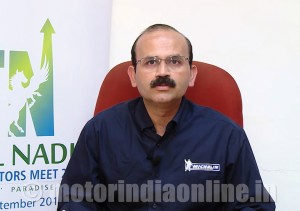
Mr. Atul Renavikar, Director, Michelin India manufacturing plant, said: “Our commitment to quality, innovation and technical performance is relentless and continuous. The ISO 9001 and ISO/TS 16949 certification applies to companies that contribute added value and quality to manufactured products. This certificate demonstrates strict adherence to the highest quality standards that Michelin is synonymous with across the world.”
The certification awarded to Michelin India encompasses development of a quality management system that exemplifies that the plant is demonstrating continual improvement, emphasizing defect prevention and reduction of variation and waste in the supply chain. It also ensures the organization meets the needs of customers and other stakeholders while adhering to the statutory and regulatory requirements related to the product, enabling the company to do business with automotive OEM customers.
